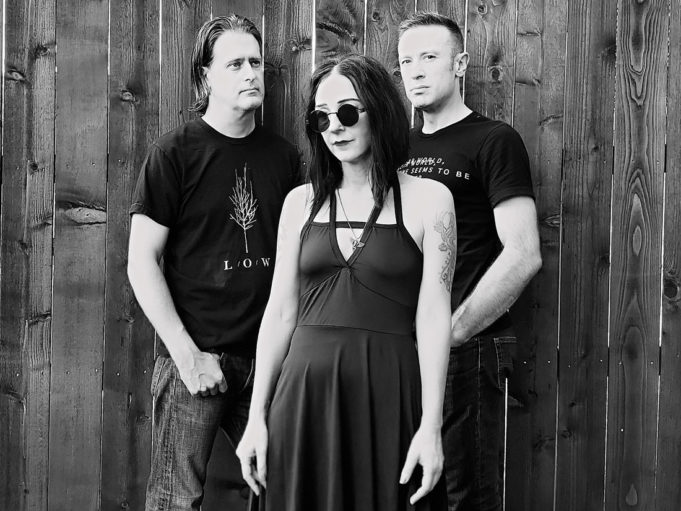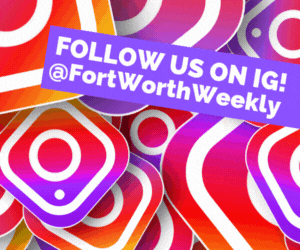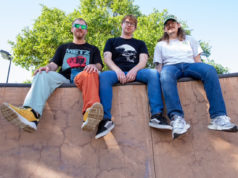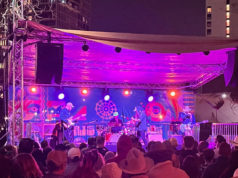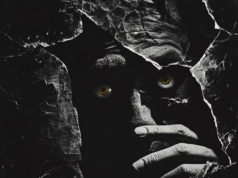It’s been three years since gloomy slow-core outfit Signals & Alibis released new music. The synth-laden sound the band debuted on 2016’s Looks Like Rain represented a new direction. Over their years playing together, they had transitioned from a foursome to just a two-piece. To make up for the loss of members, guitarist/keyboardist Brian Carter and singer/keyboardist Rebecca Jozwiak relied heavily on loop stations and switching back and forth between multiple instruments to build dreamy layered soundscapes, creating a sweeping sonic dynamic much larger than might be expected from two people. The result was an intriguingly seductive trip-hop quality added to the lo-fi PJ Harvey-esque punch their music had to that point.
Upon its release, Carter remarked that he felt Rain was as “electro” as the band was likely to get, and his plan going forward was to add new members and revert to a more guitar-focused sound. While they have, in fact, added a new member, bassist/programmer Joshua Beene, the newly formed trio has not exactly returned to the standard rock format. Instead, on Aislada, the trio’s forthcoming EP, the threesome have thankfully again leaned full-force into the spooky darkwave aesthetic they began on Rain –– and solidified what Signals & Alibis might have always been meant to be.
“Signals has always been a combination of [different] genres,” Carter said of the band’s evolution. “We’ve always been very open to whatever sound we immediately bond with. It’s all a natural shift. It wasn’t so much a stepping away from [a certain sound] but a way of trying to incorporate it all together.”
Carter and Jozwiak had known Beene for more than eight years prior to him joining. As fans of Beene’s work in his previous band, Video Lies, they had tried to recruit him to play bass multiple times over the years, but some stylistic differences and Beene’s temporary departure from music entirely kept the three from collaborating. It wasn’t until Beene was approached to tackle a track for the “Supernova Remixes” of Looks Like Rain that the three finally connected.
“I had gotten a lot more into an electronic kind of sound with the music I was interested in,” Beene said of the experience. “I always kind of connected to the vibe of what they were doing, but working on that remix really opened up the possibility for what Signals could really be.”
Beene’s addition allowed the band to forgo their dependence on loop stations – often tedious and uncooperative tools – and broaden their onstage sound by incorporating tighter pre-programmed scenes made with Ableton Live. The music production software also provided the three a convenient way to collaborate between each of their own home studios – sharing files of new song ideas that the others would add to, edit, or tweak until a fully collective vision resulted. The six songs on Aislada were created entirely this way.
“I think that if the three of us had a lot less obligations in our grown-up lives, we could spend a whole lot of time together and develop that sort of live band chemistry that comes from spending a lot of time jamming,” Beene said. “But by ‘taking it back to the lab,’ you can do all sorts of crazy experiments that maybe you’d be afraid to [in front of] the rest of the band.”
This approach has given Aislada a well-preened quality. The tracks have been allowed to develop organically at the band’s own pace, without the pressure of a running clock in a “proper” studio. Consequently, a gorgeously mournful canvas crafted for Jozwiak’s commanding vocals. The synths are thick and weighty, balanced nicely by bright piano trills and Carter’s melancholic guitar lines, an element Jozwiak finds critical to Signals’ sound.
“The most impressive thing about the way Brian plays,” she said, “is that he can play [his style of] shoegaze/post-punk guitar over any backdrop there is. If it’s electronic, country, twee pop, he’s going to find a way to make that sound. He’s perfected it.”
Aislada will be released on September 28 with a release show at the Armory in Dallas before a hometown release show at MASS on October 5. Historically sparse live performers (less than 100 shows in their nine years), Carter said the trio is excited about getting out and playing more after the EP’s release.
“The great thing about Signals is that we’re constantly evolving,” he said. “But we’ve never felt much pressure to play a lot live. But we are looking forward to [doing it] more.”



